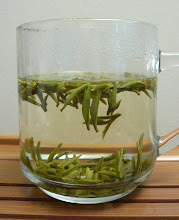The other day I had this cup of Bamboo Leaf Green (Zhu Ye Qing), freshly from Sichuan, China. It was a delightful cup of, 100% authentic, Bamboo Leaf Green. 100% authentic - if I say it too loud, I could be sued :-p I am kidding, but only 50% kidding.
Bamboo Leaf Green is involved in one of the biggest controversies about tea, and lawsuits have been raised because of it.
Bamboo Leaf Green is a famous tea from Sichuan. Many farmer families in Emei Mountain have been making this tea for years. In 1990s, Bamboo Leaf Green was registered as a trademark by Zhu Ye Qing Company. Therefore, it would be deemed illegal for anyone else to use this tea name. At that time, most Chinese farmers and local merchants were not familiar with commercial laws, and many small companies kept using Bamboo Leaf Green as their product name. Then in 1999, Zhu Ye Qing Company initiated lawsuits against tea manufacturers who, claimed by the company, violated their right of the registered trademark. Eventually, Zhu Ye Qing Company won all the lawsuits, and it was made clear by the court that nobody else should use Bamboo Leaf Green as their product name.
In spite of the result of the lawsuits, many people believe Bamboo Leaf Green, as a name of tea variety, should be a common cultural property and should not have been granted to a tea company as a trademark. Zhu Ye Qing Company did not contribute to developing the processing method of this tea, but obtained such a valuable trade mark simply by registering it. Up till today, although Zhu Ye Qing Company is the only large trader of this tea, many tea farmers still call their product Bamboo Leaf Green, and most tea drinkers buy their Bamboo Leaf Green from sources other than the company that owns the trademark. The tea I had the other day has a product name of "Bamboo Leaf Spring", although it's exactly Bamboo Leaf Green - the manufacture specializes in making Bamboo Leaf Green, but labeled their product with a different name, in order not to violate the law. I have a lot of sympathy toward them, considering they have to compete against a big company while not having an equal right of naming their products.
Bamboo Leaf Green is probably the largest trademark controversy in Chinese tea industry, but not the only one. If we look into the historical producers and sellers of puerh, Yan Cha and Liu An tea, we will see their names currently being registered by multiple companies, in different ways. Each trademark holder claims it inherits the legacy of the historical producer or seller, but basically what they had to do was simply registering a trademark in an innovative way, before anybody else did it. Like in many other industries, trademark laws are put into applications before there are enough regulations that examine the justification of each trademark registration.
This is only a beginning, as many Chinese tea producers have just stepped into the modern commercial society, and fine tea has just picked up its international market expansion. Who knows what will happen next? When I drink a cup of tea or eat an apple, I don't care what trademark it bears. The taste rules. But in the huge modern international market, trademarking is probably very necessary. Sometimes it's the only way for consumers to know where the products are from. I think it will be interesting to see how trademarks will be developed in tea industry and how the problems will be solved or unsolved.
六堡茶道美学煮茶
3 years ago
































2 comments:
I think the practice of rushing to register trademarks for personal or business gain, when the terms were in widespread use, is highly unethical. Collectively, when more businesses do this, they waste effort fighting with each other in needless legal battles instead of actually working to create a quality product. And perhaps more troubling, the small people are usually the ones who get trampled. The resulting atmosphere stifles innovation.
I would be interested in getting lists and names of companies that engage in such behaviors and putting public pressure on them to relinquish their trademarks through organized boycotts.
If what you say is truly accurate, I would prefer to actually go farther with companies like Zhu Ye Qing Company. I would like to demand that they issue formal apologies and pay reparations to each of the companies they wrongfully sued. And I would like to convince every company in wealthy western countries to boycott this company until they do so.
If even a small portion of people got on board with these things, it would put immense pressure on these companies and would put an end to this unethical and economically destructive practice.
But I would want to research this more before taking action because I would not want to advocate something as harsh as this approach unless I were virtually certain that the company had indeed acted grossly unethically and in bad faith.
Hi Alex, in this case, I think most tea drinkers are passively boycotting the product mainly because it's super expensive, as it's claimed to be the "only legal Zhu Ye Qing". In China's specific environment, it's also easy for people to get Zhu Ye Qing from other sources because for good or for bad, trademark and patent laws in China aren't all enforced in reality :-p
On the other hand, some people would even buy only from this company because the product sounds high-end and "authentic".
Post a Comment